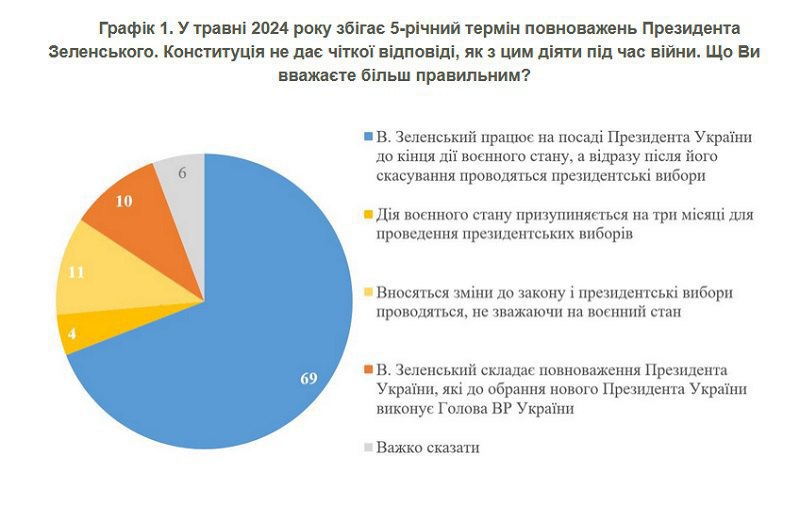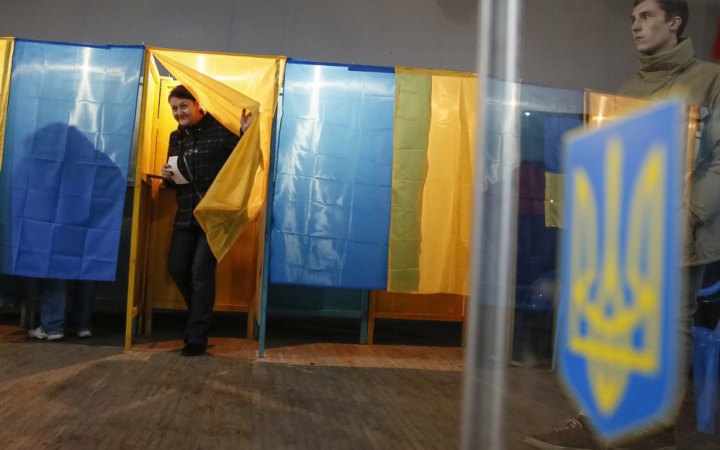The majority of Ukrainians believe that Volodymyr Zelenskyy should remain president until the end of martial law. This is evidenced by the results of a survey conducted by the Kyiv International Institute of Sociology (KIIS).
Thus, the majority of Ukrainians (69%) believe that Zelenskyy should serve as president until the end of martial law. The number of those who believe that elections should be held is 15% (of which 4% say that martial law should be suspended and 11% support amending the relevant laws and holding elections during martial law).
There are also 10% who support the option that in May 2024, Zelenskyy will resign from office and the Speaker of the Verkhovna Rada will perform his duties until a new president is elected.

Among those who do not trust him, 38% agree that he should serve as president until the end of martial law, and 54% support options for a change of power (31% of them believe that elections are possible, and 23% believe that powers should be transferred to the Speaker of Parliament).

At the same time, regardless of their views on the need for elections, more than half of Ukrainians (53%) believe that Zelenskyy should run in the next election. In December 2023, the number was 59%. At the same time, the share of those who believe that Zelenskyy should limit himself to one current term has increased from 34% in December 2023 to 43% in February 2024.
Residents of the western and southern Regions are the least likely to support Zelenskyy's participation in the next elections, while those in the Centre and East are relatively more likely to support him.
"Promoting the narrative that the president loses legitimacy in May 2024 primarily plays into the hands of Ukraine's enemies - it will undermine the situation and unity within the country and undermine support for Ukraine from Western allies... It is extremely difficult to organise elections - millions of people are abroad, millions are in dangerous conditions or under occupation, hundreds of thousands are serving in the military. The lack of opportunities for citizens to participate in voting as voters and candidates will undermine the legitimacy of the results (with 65% of Ukrainians having a negative attitude towards online voting). The scenario with the transfer of powers to the Chairman of the Verkhovna Rada contains, firstly, the problem of trust and, accordingly, public legitimacy. For example, quite a few Ukrainians do not know Stefanchuk, and among those who do know him, there are more who do not trust him. Other prominent public figures, such as members of parliament, who may be contenders for the post of chairman, also do not receive much trust. Secondly, the question still remains as to how long the Chairman of the Verkhovna Rada can act as president without holding elections," commented Anton Hrushetskyy, Executive Chairman of KIIS.
The survey was conducted among adults (aged 18 and older) who were residing in Ukraine at the time of the survey (within the territory controlled by the Ukrainian authorities until 24 February 2022). The sample did not include residents of the territories temporarily not controlled by the Ukrainian authorities, and the survey was not conducted with citizens abroad.
Formally, under normal circumstances, the statistical error of such a sample (with a probability of 0.95 and taking into account the design effect of 1.1) did not exceed 3.2% for indicators close to 50%, 2.7% for indicators close to 25%, 2.1% for indicators close to 10%, and 1.4% for indicators close to 5%.








